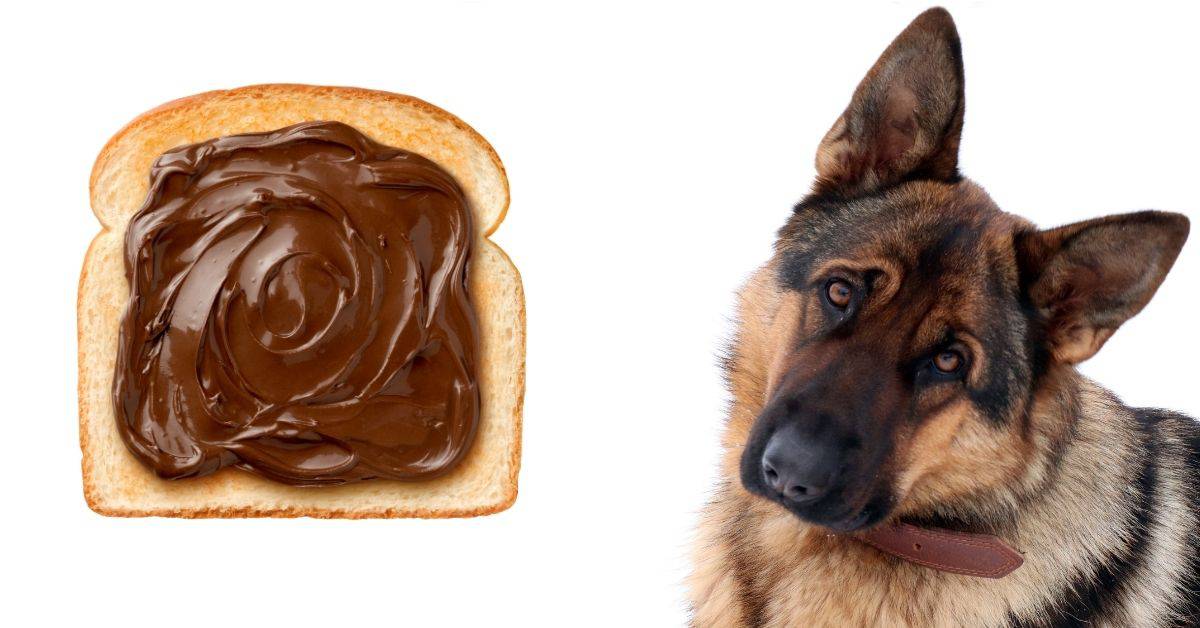Most likely, you are eating warm waffles with Nutella, and your canine companions come over as you cook another treat, drooling heavily on their paws.
Are you supposed to let them lick the Nutella off your spoon?
You’ll want to read this blog post first before proceeding.
So, can dogs eat Nutella?
No, since cocoa is one of Nutella’s ingredients, dogs shouldn’t eat it.
Chocolate poisoning in dogs is possible since cocoa harms our canine companions.
A significant disease may follow depending on how much Nutella your dog consumes.
Nutella contains additional chemicals that are harmful to dogs, in addition to cocoa.
So it’s advisable to avoid feeding Nutella to your dogs.
To assist you, we’ve offered a few solutions for the case, that your dog grabbed some Nutella accidentally.
Additionally, we will go over each component in the Nutella jar in detail and examine how it may impact the general health of your dog.
Also, we’ll review Nutella’s nutritional value so you can better understand it.
Why Nutella Is Bad For Your Dog
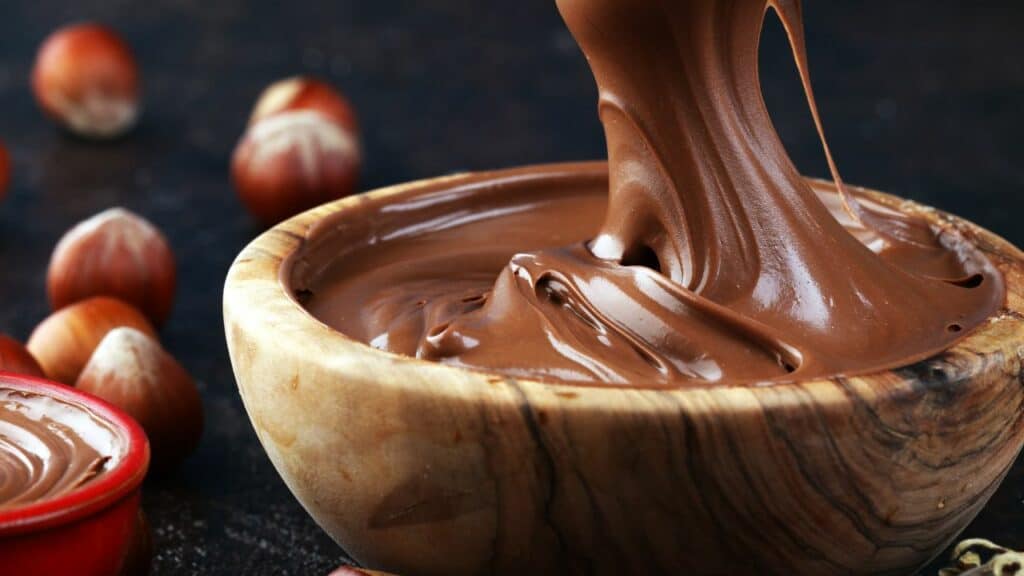
Nutella has little nutritional value for your dog and may even be harmful if given frequently.
This paste’s components list includes chocolate, milk, sugar, hazelnuts, and palm oil.
Although they won’t hurt your dog in small amounts, none of these ingredients are good for dogs.
Making Nutella a regular component of your dog’s food could have adverse long-term effects and jeopardize their health.
Sugar
Nutella is too sweet, even for our tastes.
That accounts for a significant portion of why it makes bread taste lovely.
A dog’s sugar tolerance is significantly lower than a human’s, so feeding them even a bit of Nutella could be dangerous.
That may also contribute to obesity-related problems and potentially trigger pancreatitis.
Nutella is not a good snack for your dog because it poses several genuine and severe health risks and contains no components your dog would benefit from besides flavor.
Fat Content
There is a lot of fat in Nutella.
It doesn’t do much harm to us because we usually consume it in moderation and treat ourselves to it.
Because of our stature and the differences in our diets from those of dogs, our bodies are better able to process fat.
Dogs consume low-fat diets by nature.
When you do the arithmetic, you realize that dogs consume three times as much Nutella as humans.
Obesity, poor nutrition, and other chronic and immediate health problems are some possible effects.
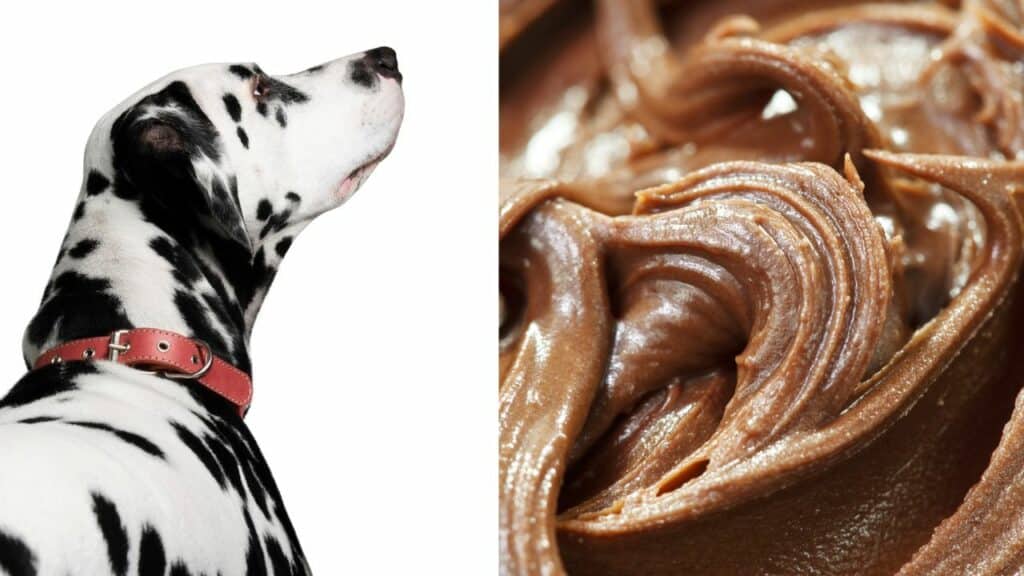
Cocoa Powder
Cocoa is one of the components of Nutella.
The precise volume of cocoa in a jar of Nutella is trade secret information.
As a result, we cannot precisely estimate the amount of cocoa used in the recipe.
Cocoa powder is toxic to dogs because it contains theobromine and caffeine. Caffeine and theobromine are highly toxic to dogs and can cause unpleasant symptoms.
Skimmed Milk Powder
Skimmed milk powder, a dairy product, is another ingredient in Nutella.
That is because skimmed milk powder is created from cow’s milk, commonly referred to as dry or powdered milk.
In essence, water is taken out of pasteurized skim milk.
Please refrain from giving your adult dog buddies Nutella if you know they are lactose intolerant.
A few minutes after eating Nutella, they could begin to feel queasy.
Other indications of canine lactose intolerance include:
Bloating
Diarrhea
Abdominal pain
It’s crucial to understand that most adult dogs are lactose intolerant.
In general, newborn puppies have an abundance of lactase enzymes to digest the lactose or sugar in their mother’s milk.
As they begin to wean themselves from their mother’s milk, their ability to digest lactose decreases, and they eventually develop lactose intolerance.
Remember that whereas cow’s milk has a 5% lactose concentration, their mother’s milk only has a lactose concentration of about 3%.
As you can see, despite having a lot of lactase enzymes, even newborn puppies have trouble correctly digesting cow’s milk.
Dairy products would therefore be complex for older dogs to digest.
Theobromine
Because it contains theobromine and caffeine, which have detrimental effects on canine hearts and nervous systems, cocoa is deadly to dogs.
Additionally, some sweets and even some tea bags contain theobromine content.
Your dog will become ill from these poisons, which might even be fatal.
Cocoa consumption can cause elevated blood pressure, an accelerated heart rate, and seizures in dogs.
What Happens If My Dog Eats Nutella?
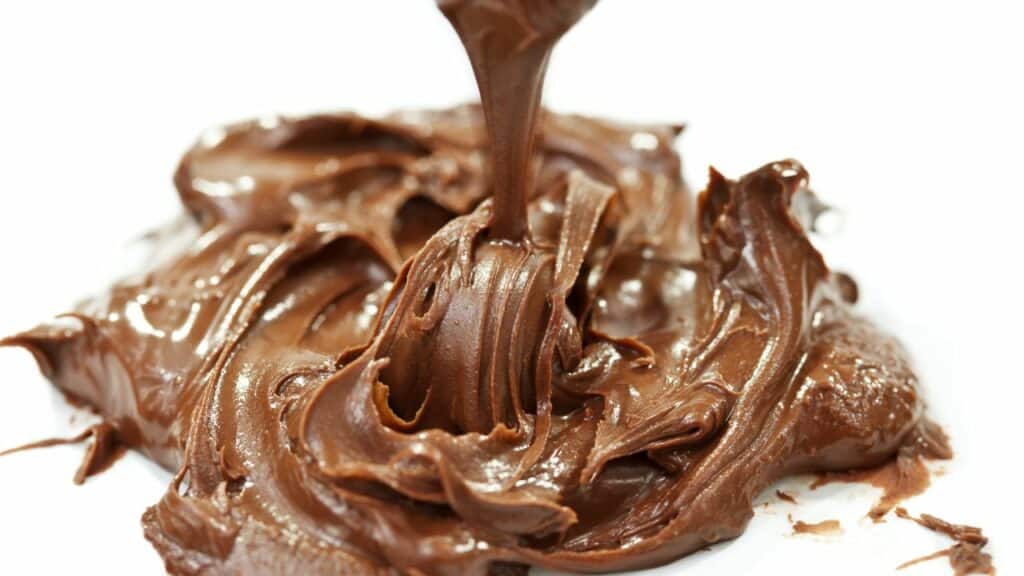
The ingredients in Nutella will aggravate your dog’s stomach and intestines.
The more food your dog eats, the more likely it is that specific components will cause problems for him.
As we’ve seen, fats can inflame organs and are particularly dangerous.
None of these conditions should be ignored since, if addressed, they could kill your dog.
Bad For Dogs Metabolism
Sugar consumption can also impact your dog’s metabolism as it increases.
His entire body’s muscle tone will start to deteriorate.
You’ll observe more fat storage than muscles.
It will be difficult for dogs to walk or engage in physical activity because of their excess weight and fat.
Instead, your dog will be weaker and more susceptible to infections, diabetes, and other hormone-related illnesses.
Upset Stomach
If your dog consumes more than a spoonful of Nutella, he can experience the consequences of too much sugar right away.
Dog’s stomach will begin to feel uncomfortable.
That is because consuming too much sugar compared to what your dog is used to can upset the balance of bacteria and other vital germs in your dog’s intestines.
The dog will begin to exhibit symptoms of an upset stomach when the balance of germs and microbes in his stomach is perturbed.
Signs and symptoms of an upset stomach include:
Vomiting
Bloody diarrhea
Explosive diarrhea
Teeth Problem
Dogs can develop cavities, poor breath, and tooth decay when they overeat sweet food, snacks, or treats, just like people.
The mineral or outside layer that protects your dog’s teeth, the enamel, is crucial. The sugar still on your dog’s teeth, tongue, and gums is used by the bacteria in his mouth to create acids.
The dental enamel of your dog eventually becomes worn down by the acids.
Losing enamel increases the risk of cavities, gum disease, and tooth decay.
If you know that your dog has consumed Nutella, be careful to wash his teeth.
We strongly advise using canine toothpaste to brush your dog’s teeth.
Diabetes
Let’s not forget that if dogs continue to gain weight, they could eventually get Type II diabetes.
Your dog’s body will no longer be able to metabolize sugar properly.
As a result, your dog’s bloodstream becomes overloaded with sugar, and the cells in your dog’s body cannot utilize the sugar to produce the energy your dog needs.
Weight Gain
Regularly feeding Nutella to your dog is not advised.
In the long run, this could lead to canine obesity because it can make dogs gain weight.
That is because sweetened foods and snacks are considered high in empty calories.
They rapidly increase the weight of your animal family members without providing any nutritional benefits.
When our canine friends begin accumulating weight, it can affect their physical, psychological, and emotional health.
Weight gain over time stresses your dog’s joints, resulting in pain and injury.
Dogs that begin to gain weight risk becoming fat in addition to feeling exhausted and losing interest in playing or going for walks.
Your dog may start to experience joint pain, low mood, and feelings of sadness, anger, anxiety, and depression.
Their immune system may be harmed by this, leading to issues including breathing difficulties, heart disease, arthritis, and even pancreatitis.
Is Nutella Toxic To Dogs?
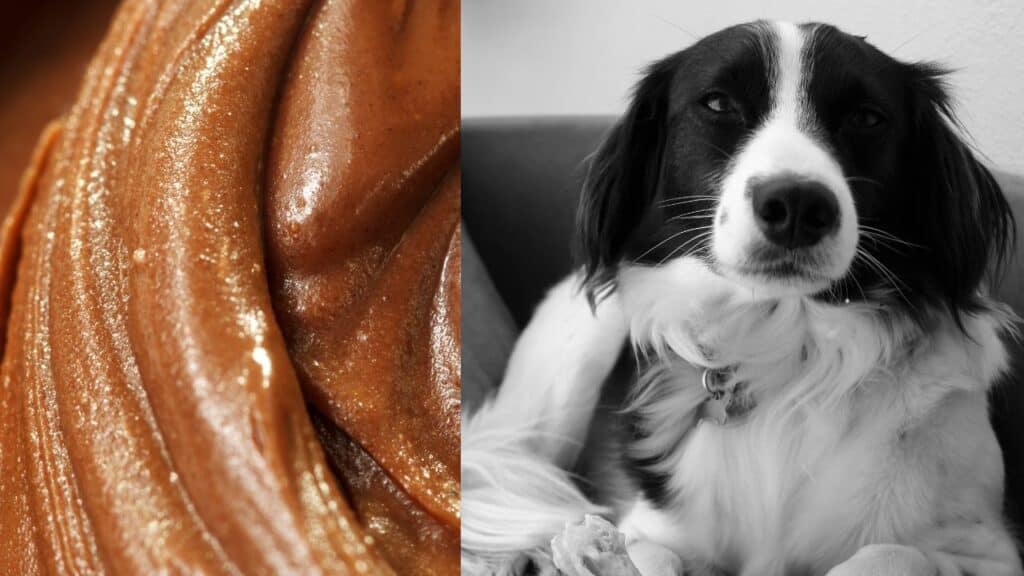
The good news is that dogs typically don’t get dangerously sick after eating Nutella.
Although theobromine and chocolate in the form of cocoa are present, they make up a relatively minor percentage of the whole mixture.
If you check the Nutella ingredient list, you’ll notice that cocoa is near the bottom of the list.
Nutella contains more sugar, palm oil, hazelnuts, and skim milk than chocolate in terms of weight.
That suggests that even a small amount of theobromine consumed by a dog is unlikely to be harmful.
Small dogs might be able to swallow enough theobromine to become unwell, but the other components will likely make them sick before they become ill from the cocoa content.
Does Nutella Contain Xylitol?
Xylitol, an artificial sweetener, is used in many human products to reduce the quantity of natural sugar.
Nutella typically doesn’t have Xylitol because it isn’t promoted as a sugar-free topping.
However, as time passes, this sweetener’s popularity grows.
Human-branded items don’t have to hide the fact that they utilize this sweetener because it is harmless to humans.
Your dog could die from even a minimal amount of sugar because it can harm them permanently.
Make sure there is no xylitol in the Nutella before you even think about giving it to your dog.
That is crucial if you want to buy “reduced sugar” Nutella, a store brand, or an off-brand version!
Can Nutella Kill A Dog?
Given that Nutella has only a tiny amount of each of its active ingredients and that your dog is large enough to tolerate them, ingesting a small amount shouldn’t harm your dog (except for Xylitol).
Nevertheless, depending on the quantity, ingredients, and degree to which your dog accepts them, Nutella can potentially harm your dog.
If your dog ate a significant amount of this hazelnut spread, you should take them to the vet as soon as possible.
Considering your dog’s medical history, your veterinarian can help you find the best healthy diet for your dog.
My Dog Ate Nutella – What Should I Do?
Here are the steps you need to do if your dog are Nutella:
Separate your dog from the spill or remove any leftover Nutella to prevent them from acquiring more.
Examine the label next. In addition to hazelnuts, look for Xylitol (E967) and other nuts in the ingredient list.
If the only ingredients listed are sugar, palm oil, skim milk, and a trace of cocoa, your dog should be fine.
If there is Xylitol included, or your dog ate a lot of Nutella, immediately call your vet.
Keep an eye on them and be prepared to take them outside to use the restroom if necessary.
When a dog ate Nutella he may vomit or have diarrhea as a reaction to the chocolate, fat content, or richness of the food.
The likelihood is high that you won’t notice any symptoms, but you should keep an eye out for them even if you don’t.
When To Visit A Vet
If your dog ate a lot of Nutella or if it contains Xylitol, it can become a very dangerous situation.
If so, you should visit the vet as soon as possible with your pet.
It would help if you told your vet how long ago your dog ate Nutella and how much it was.
That must be taken care of immediately since your dog risks getting very unwell.
Frequent urination
Higher body temperature
Seizures
Panting restless
Weakness
Conclusion: Can Dogs Eat Nutella?
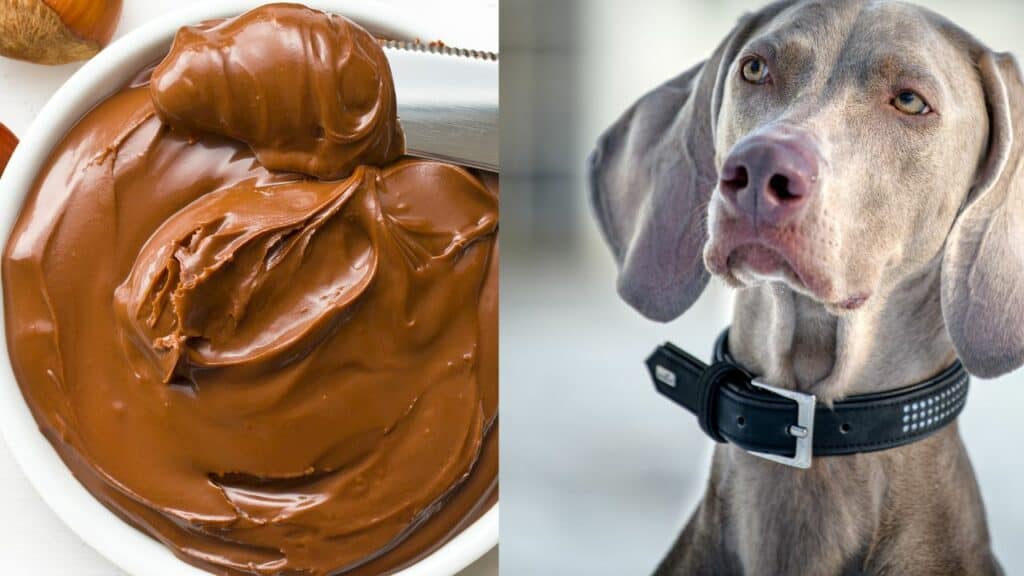
No, dogs can not eat Nutella.
It is bad for dogs and dogs should not eat it.
If responses are not managed, they can cause pancreatitis and stomach problems and possibly be fatal.
It’s best to be aware of these symptoms and consider secure substitutes.
Although Nutella may be safe for dogs in moderation for all the reasons mentioned above, it is not advised.
Do you know anyone who likes to feed their pets this chocolate spread?
Tell them about this so that everyone can stay safe!
Before You Go…
Now you know the answer to the question, “Can dogs eat Nutella?”.
If you want to learn more, read the following articles too!

